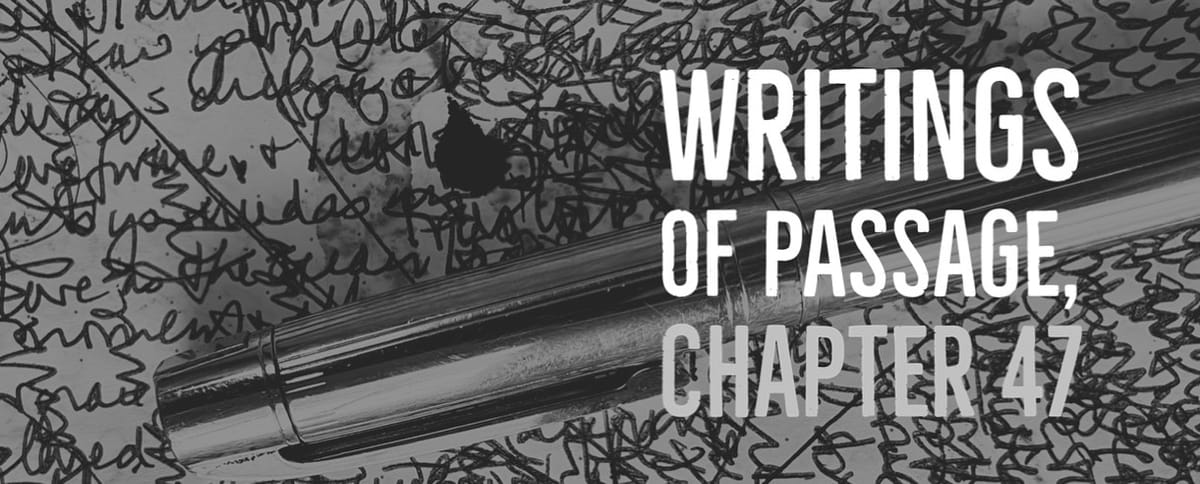WRITINGS & RITES & PASSAGES

Chapter 47 of this Apprenticeship to Love: Meditations on this Path to Authentic Relationship, February 16, 2024
- Today's playlist: Silence...
- Today’s questions: What small (or large) rituals do you have, that help you break open and pay attention to this moment, your opening or closing in this moment?
- Today's suggested practice: Day 16 of this month's practice, a breath work for "balancing," to allow these thoughts and feelings to move through you, with less resistance (see my "Short Practice,” below)
- My practice today: 5am: 45 minutes: yoga, Ganesha mantra meditation
- My vulnerability practice: Feeling the "tension, pressure, friction" of this moment and welcoming it!
★FREE tickets for the Apprenticeship to Love "1000 early readers" list — my conversation with Katie Love on February 20. Our topic: the Sacred Womb, Marriage, Men & Women & Sex, & more... Please register at https://bit.ly/3uupVrW
TODAY'S MEDITATION
I wrote this the other day: We are made to hold each other. Somewhere, sometime along the way, we learn to hold ourselves.
I borrowed that from an unknown source. Their phrase was something like, "Our nervous systems are built for each other."
Interestingly, our culture prizes independence. We've even gone so far on the "healing" side of things to say that dependence is co-dependence. I also know it's more complicated than that. I know, in my own experience, there is great relationship work to be done, addressing how dependence can be soul-destroying when it becomes "co-dependence." I don't want to quibble about that. But I do want to quibble about how easily we've turned any kind of dependence into a negative thing.
Let me write about tango for a moment to illustrate my point...
...
There is a way of being together in tango that's called "apilado." In Spanish the word means "pile" or "piled up." In tango, the dancers are leaning towards each other, as if they were sticks "piled up," leaning on each other, as in a campfire about to be lighted.
In apilado the dancers are in a dependent relationship. Again, like the culture at large, tango emphasizes independence of balance, posture, etc. However, there is a recognition that the art of tango happens in those moments of "tension, pressure, friction" where independence is sacrificed for something larger —the dance. The moments of art between two bodies responding to each other, to the music, to the movements around them.
When I teach I teach from the basis of independence of balance and posture. But this is the starting point only. This is the point we move from and to, and through, as we experience the depths of what we two can create. We need dependence. We need to be able to surrender to each other and to this moment of losing our independence.
I think the same is true of marriage.
...
Today is devoted to two things. Three, actually. One is writing the ritual of a wedding. A second is writing the rituals of a retreat about the arts of intimacy. The third, preparing to receive my daughter and my granddaughters for the weekend. All are about relinquishing independence for the sake of art. One is the art that is born of the crucible of marriage. The second, the art of teaching that will transform me, my colleague, and all the men and women, whether singles or couples, who are part of the retreat. The third, the art of opening up my comfortable habits to the disruption of my adult daughter and my very young grandchildren. All of these involve some kind of sacrifice, of the comforts of independence and/or the current moment.
Here is what I desire:
- That the couple to be wed experience an "unbalancing" and a disruption that enables them to take their existing relationship to a deeper and higher level.
- That the workshop participants experience the "breaking open" and discomfort that enables them to create greater intimacy, trust, loving in their relationships.
- That my daughter and her daughters experience warmth and ease and capacity to flow within the structure of my home, my heart.
In every situation there is a ritual element. That ritual will, at the very least, be a moment of acknowledging the sacrifice, that experience of feeling the security and comfort of this thing called independence dissolving into the unimaginable moment to be created. Often these thresholds are crossed unconsciously. As I write and as I prepare, I am trying to bring the fullness of my consciousness into play. This is my gift to every one of these moments. I am writing the rites of passage, and even in the writing knowing that my words and thoughts must surrender, must be sacrificed, to the art of the moment of crossing the threshold.
...
The loss of independence is judged as a terrible thing. For good reason. We've created an atomized culture. The modernization of economic and political life has rendered almost every non-exchange relationship an anachronism. The village. Extended kinships and families. Marriage itself struggles to survive.
And yet, our nervous systems were built to hold and support and depend on each other. So we have some vestigal need, it seems, to be together. To seek to create bonds with others that aren't about exchange, that aren't transactional. It's a hard life for some of us who feel this need most acutely. For the rest of us, we seem to drift along, more or less happy with the way things are disintegrating around us...
...
I am here, at 64, writing to understand my own seeking and my own difficulties with dependence/independence. (The word "interdependence" is a mental sleight-of-hand that pretends to do away with the tension. It doesn't, at least in my lived and observed experience.)
...
I listened to a man I admire talk about the impact of Ivan Illich on his life. It reminds me of the importance of our anachronistic yearnings. I'll paraphrase my understanding of Illich's critique of modernity: We think we know better than those we judge to be suffering. But all of our thinking and doing based on this thinking only makes the suffering more real and more complicated. The only beneficiary here is ourselves: we've transformed our discomfort with another's suffering into self-righteousness.
Sacrifice and suffering are not popular. Never have been. Some wisdom traditions suggest that conscious suffering and conscious sacrifice are a price we may choose to pay for deeper appreciation and experience of love.
What I experience in tango, and in love, and in life, is that I can choose to stay in the comfort of hard-won independence (though it too is chimerical, as climate change is teaching). I can choose this relative stability and constancy. Or, I can choose to sacrifice it and suffer the tension, pressure, friction of falling out of balance, out of independence, making myself vulnerable to the possibilities of others' actions, thoughts, feelings. Sometimes I've known art, beauty, love. Sometimes, not so much.
The worst thing, beyond the judgement of losing independence, is to feel rejection because of choosing to be vulnerable. Choosing to "lean on." Choosing apilado.
...
"She can smell your desperation," he said, my wise friend. "She can smell it in your voice. As long as she smells your desperation you are not safe for her."
That may be. I can feel this. And, I am desperate —and I invite her despair into my own embrace. Thus this tango continues, and some kind of unimaginably beautiful dance is created. Haltingly. With pauses (the silences of tango are reknown as the true source of beauty). With the moments of stumbling towards grace that mark this as true, as unrehearsed, as coming from a deep and honest place.
I would not be the man I am today without this woman and her vulnerabilty, and my awkward willingness to stumble into my own vulnerabilty, my desperation to be leaned on. This relationship continues to have the biggest impact on my spiritual growth of any in my life. It is, now, the most important thing in my life.
...
Today I am writing ritual. To break open the hearts that have become used to things —used to each other, used to the small now tired gestures of affection that signal rote repitition and not the calling to attention that these gestures once commanded.
Today I am thinking and writing about how to revere the moments that break us from comfort and into the discomfort that invites vulnerability. Moments that become the intimacy so many of us yearn for in a culture that prides hardness and disinterestdness and independence.
We are born dependent. We die, dependent. While we live, what part can I play in inviting myself —and you too, dear reader!— to lose yourself in dependence, if only for brief, shining, painfully and terribly and profoundly beautiful moments.
TODAY’S INSPIRATIONS
🌀Love is not a feeling of happiness. Love is a willingness to sacrifice. (Michael Novak)
🌀The Conscious Warrior makes death an ally, using it to sharpen his present actions, future plans, and current state of being. (John Wineland , Precept 11)
🌀 All we can do is prepare ourselves the best we can, with patience, dedication, and commitment. …do your practice without trying to achieve a goal but rather as a beautiful act of self love in which you offer yourself the opportunity to grow and facilitate a shift in consciousness. (Kundalini Yoga School, Shakti sadhana, Day 36)
🌀Thy right is to work only, but never to its fruits; let not the fruit-of-action be thy motive, nor let thy attachment be to inaction. (Bhagavad Gita, 2:47)
🌀…practice your practice when you experience benefit, and when you do not; …use kindness in the presence of opposition, and gratitude in its absence; …look for the miracles within the midst of each moment, and know that you’re close to the source when you’re feeling the most lost . . . your time is just now coming. (Guru Singh & Guruperkarma Kaur)
🌀 You are beautiful. (My beloved, my Oracle & Siren, my wife)
TODAY'S SUGGESTED SHORT PRACTICE
Day 16 of this month's practice, to let these thoughts and feelings move through you, with less resistance:
Please read through first, then ...
- Set an alarm, for a time of the day when you have a few minutes to become conscious of who and how you are in this day
- When the alarm sounds, wherever and however you are, take a few minutes and:
- Ask yourself: What small (or large) rituals do I have, that help me to break open and pay attention to this moment, my opening or closing in this moment?
- Then, follow the short practice here:
- When you’re done, sit or stand for another minute or two, breathing gently, slowly filling and emptying your belly. Here, as you breathe into your fullness, ask yourself, Do I feel right? In alignment with the man or woman I am? Do I even have an inkling what that might feel like? Do I even have an inkling of what it feels like to be out of alignment with myself?
- Notice if your body-mind feels somehow changed. And whether you notice a change or not, be content with yourself, exactly as you are in this moment.
- Continue with your day until the next alarm sounds, and repeat.
RECENT & UPCOMING EVENTS FOR SUBSCRIBERS
The upcoming February 27 Apprenticeship to Love virtual workshop with Sarah Anderson is free for Premium, Premium+, and Premium EXTRA subscribers. Upgrade here.
Sarah Anderson and I talking about Valentine's Day, this in-between season, and intimacy...

